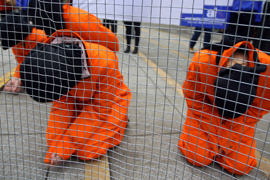US accused of authorising ‘torture’
White House denies justice department memos authorised painful interrogation methods.

At a Thursday press conference, Dana Perreino, the press secretary, avoided answering a barrage of questions on the issue, except to say: “The policy of the United States is not to torture.”
‘Lawful practice’
Perreino reiterated that the US was well within the law and the Geneva Conventions in the interrogation methods that it practiced.
She confirmed the existence of a classified memo dated February 5, 2005, on what constituted legally acceptable interrogation techniques, but refused to comment on whether it authorised specific practices such as head-slapping and simulated drowning.
The 2005 memos were issued shortly after Alberto Gonzales took over as attorney-general.
Gonzales resigned last month amid criticism he was more loyal to the White House than to upholding justice.
‘Accepted behaviour’
|
“If you have got lawyers who will say that black is white and right is wrong and water boarding is not torture, then it really doesn’t matter what the law says” Elisa Massimino, Human Rights First |
Human rights advocates are outraged at the allegations of state-sanctioned torture.
Several groups including the American Civil Liberties Union and Human Rights First have repeatedly called for an independent probe into the department’s opinions on torture.
Jennifer Daskal, of Human Rights Watch, said: “If the reports are true, this administration – or at least the justice department – produced a memo that said that water boarding which is a form of mock drowning, mock execution; head-slapping; subjecting detainees to prolonged cold is acceptable behaviour.”
Elisa Massimino of Human Rights First said: “Publicly, of course, the administration says ‘we don’t torture’. The president has said ‘we don’t torture’. But that is really why these secret legal memos make such a difference.
“If you have got lawyers who will say that black is white and right is wrong and water boarding is not torture, then it really doesn’t matter what the law says.”
Water boarding is the practice of pouring water over an individual’s head after immobilising him or her to simulate drowning, a technique that is also used in some forms of military training.
Anti-torture policy
According to the New York Times report, the 2005 memo which explicitly allowed using the painful methods in combination came months after a 2004 legal opinion in which the justice department publicly declared torture “abhorrent”.
 |
| Human rights groups have repeatedly called for investigations into torture allegations [AFP] |
Despite efforts by congress and the courts to limit interrogation practices used by the government, the 2005 opinions remain in effect.
The White House and US justice department have said the 2005 memo did not change the 2004 policy.
Brian Roehrkasse, a justice department spokesman, said the 2004 opinion remains in effect and that “neither attorney-general Gonzales nor anyone else within the department modified or withdrew that opinion”.
The US congress has prohibited cruel, inhuman and degrading treatment of terror suspects.
Following the revelation, Democratic legislators have demanded the justice department hand over the memos, and have called for congressional action.
Senator Edward Kennedy said “this revelation shows that the justice department has fallen even lower than we had realised and it is up to congress to take a firm stand against torture because this executive cannot be trusted to do so”.